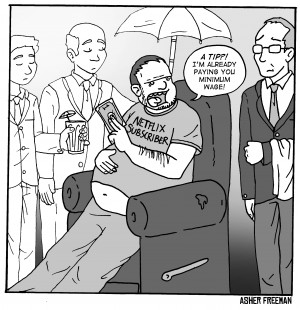In the past few years, Netflix, the movie and television streaming and DVD service, has grown like a rabbit family, racking up subscribers all over the world. It has brought about the Netflix binging craze that has forced many college students into hibernation at one point or another to watch insane amounts “House of Cards” or “Mad Men” in one sitting.
It is no secret Netflix has become a part of our lives and has infused a breath of fresh air into modern television. On April 21, in an open letter to shareholders, Netflix caused a stir when it revealed it would increase prices. Many customers slammed this strategy, but it is the right move for the company.
In 2011 when Netflix planned a price raise for its combo of DVDs and online streaming from $10 per month to $16 a month, the company experienced a massive backlash. Its stock price collapsed by nearly 80 percent and lost approximately 800,000 subscribers. This time, though, it is a smart move. One that will benefit customers by allowing them to continue developing current and new proprietary content. Plus, existing members will be allowed to stay at the current pricing for what the company calls an “extended period of time.”
Prices will only be raised by $1 to $2 per month, so college students can still afford its streaming services. The increase amounts to less than a cup of coffee from Starbucks each month and it will give us more of “House of Cards” and “Orange is the New Black.”
It will also allow Netflix to continue creating more original content. After all content is king. Who needs a $40 cable subscription when you have better all-you-can-watch content for a fraction of the price?
For those who are up in arms about the price increase, it is important to point out that other online providers, such as Hulu, charge the same $7.99 as Netflix for premium streaming and customers are still bombarded with 30 seconds to three minutes of commercials intermittently throughout a single episode.
Netflix, on the other hand, allows to users to watch shows completely uninterrupted. Anyone who has experienced such a thing knows that television without ads is pretty much priceless. Netflix is by no means trying to milk its customers for money with this move; it is looking to enhance the viewing experience by offering a wider variety of content.
Sure, some people could care less about original content and don’t want to pay more. But even with the price increase, Netflix still provides the most bang for customers’ buck because of its selection and its great original content.
There are only two ways subscribers can react to the price increase: cancel their Netflix subscription and lose access to a massive Disney catalog or roll with the change and forfeit a few dollars for the greater good of procrastination.
For those who don’t cancel, the outcome is clear. More money for Netflix means more money for better quality and improvements. Improvements mean stiffer competition and stiffer competition among providers forces better quality across the board for viewers. The moment you decide to stay with Netflix, you give them a reason to continue to up their game.
While it is easy to complain about an insignificant price increase, it is beneficial for subscribers in the long run. But everyone will have to make the decision: How much is “House of Cards” worth to you?







